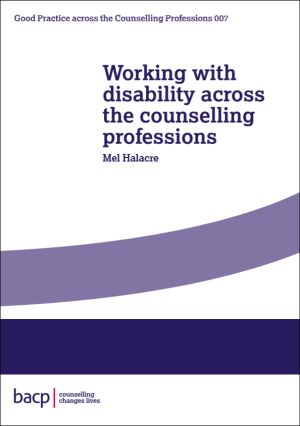Disability is unique compared with other diversity groups, in that anyone may become disabled from birth or at any stage of life. It evokes complex and often unconscious thoughts, feelings and behaviours, that influence how we interact with a or another disabled person.
It can be hard to acknowledge awkward feelings and complex interactions surrounding disability. This resource aims to make this easier from a place of safety, openness, acceptance and empathy. Our focus is on increasing awareness to provide effective therapy.
This resource is a starting point for further discussion, reading, CPD and reflection and assumes limited prior knowledge of the complexities of disability. It aims to give an overview of common themes and ideas to encourage affirmative practice.
Contents
- Introduction
- British view of disability
2.1 Models
2.2 History, power, oppression and the legacy of non-affirmative practice
2.3 Impact on therapist and client
2.4 Intersectional understanding - Common themes
3.1 Physical barriers are far-reaching
3.2 Isolation
3.3 Trauma
3.4 Third parties
3.5 Bodies, sex, intimacy and relationships
3.6 Touch
3.7 Futures and death - Groups with distinctive themes
4.1 Congenital and acquired impairments
4.2 Health-related chronic conditions
4.3 Invisible impairments
4.4 Mental health intersectionality - Affirmative working
5.1 Transference and projection
5.2 Exploring the individual or collective
5.3 Language and communication
5.4 Changing and challenging boundaries
5.5 Supervision and training


Using good practice across the counselling professions resources
These resources are not contractually binding on members but provide general information on particular fields of work, in the context of BACP’s core ethical principles, values and personal moral qualities.
Individual practice issues are often complex and will vary depending on your clients, models of working, the context of the work and the kind of therapeutic intervention provided. We'd always recommend discussing practice dilemmas with a supervisor, a legal advisor or another suitably qualified and experienced professional.
